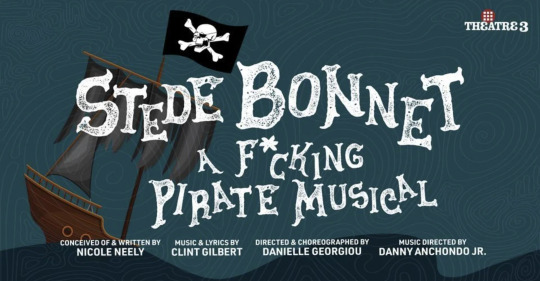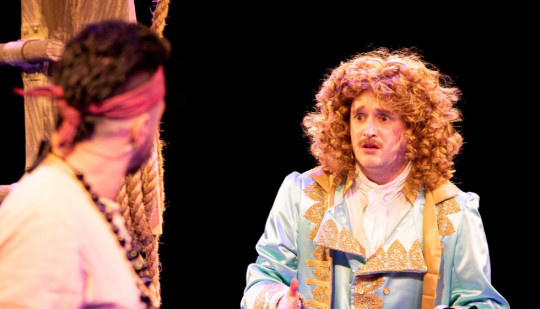#a classic genre of calamity post: in-depth analysis of obscure media with niche target audience <3
Text
Stede Bonnet: A F*cking Pirate Musical (a review, of sorts)

Recently, I — like many of y'all — kinda sorta lost my mind over a new TV comedy inspired by a certain 18th century pirate.
While Stede Bonnet was not the most obscure marauder in history, I gotta say, I don't think I'd ever heard of him before Our Flag Means Death came along, and I certainly don't recall encountering him in any media before that. So imagine my surprise when, shortly after I binged the gay pirate show, fully in the throes of fresh brainworms, I caught wind of a new stage musical based on that very same pirate that just happened to be making its premiere right after OFMD! What a coincidence, right? And naturally, having just become enthralled with one fictionalized take on the Gentleman Pirate, my curiosity could not help but be piqued!
All this is to say: there is a musical about Stede Bonnet, and I watched it, and I had a pretty good time. So I wanted to tell y'all about it and share some of my thoughts on its themes, its music, how it adapts Stede Bonnet's story, and its take on him as a character.
Stede Bonnet: A F*cking Pirate Musical runs through Sunday, May 1, with digital performances on April 30 and May 1 for those interested in watching online.
First, a bit of a disclaimer. Although I talk about OFMD in my introduction to this post in order to explain why I was interested in seeing this play in the first place, I did not go into the theatre with any intention of pitting the two against each other, nor do I intend to do so now. These shows may be based on the same historical figures and events, but each is its own independent creative work, and moreover, both are over-the-top comedies that are... not exactly preoccupied with historical accuracy. Like, at all. The Stede in SB:AFPM is not OFMD Stede, and both are quite far removed from the Stede of history. So although I'm posting this in large part because I think this musical might be of interest to people who, like me, first became aware of Stede Bonnet through OFMD... Don't expect this to be OFMD, and don't judge it on that basis.
The Story, Characters, and Themes
This is a fun, energetic, occasionally poignant show, and I'm glad I got to see it. The performances were delightful, with a lot of absurdity, physical comedy, and talented singing; the audience was laughing aloud throughout. I really liked the set design: it's simple but effective, performed in the round, centered around a main platform bearing a ship's mast (complete with a ladder and sail). The floor is dappled in blues and greens to look like ocean water, there are ropes for actors to swing on and more ropes dangling ship's lanterns, a cannon up in one corner and a lot of humorous little touches in the props. The overall effect is quite charming and pretty.
The story opens just before Stede impulsively sets to sea and covers through the end of his pirating career, focusing mainly on his "collaboration" with Blackbeard. Stede and Blackbeard are two of the principal roles, along with Israel Hands and Elsie, a barmaid on a quest for revenge. Three other actors play all the supporting roles — primarily the pirate crew and assorted birds (signified by wearing colored beanies with eyes and beaks), who act as a sort of Greek chorus.

(Israel and Stede. Photo credit: Jeffrey Schmidt / CultureMap)
Although Stede — bedecked in florid aristocratic fashion, his hair in buoyant ringlets, his face powdered and cheeks brightly rouged — provides a huge amount of the show's comedy through his eccentricity and incompetence, his character arc is fundamentally about... depression. And grief. He starts out the play not merely discontent with his life, but suicidal and numb. It's clear that he has never recovered from the death of his young son and feels, himself, dead inside. He loves his wife and children, he has everything he needs... but still he feels empty.
Grief is also one of the major themes of the storyline that runs parallel to Stede's: that of Elsie the barmaid. I'm still not sure how I feel about how she fits into the structure of the narrative. She is very much the hero of her own story: she's got her own agenda that just so happens to intersect with Stede's, and ultimately, her storyline ends up driving a fair amount of the action. She gets at least as many arias as Stede does and, honestly, felt more like the emotional heart of the story than Stede.
Israel Hands is heavily involved in both Stede's and Elsie's narrative arcs, and he's a nuanced, sympathetic character who likewise does a lot of the heavy lifting in the show's more emotional moments. Blackbeard (played by a woman) is the primary antagonist, a theatrical, ruthless, and cheerfully manipulative charmer who is using Stede for his own ends.
Props to all of the actors in the main roles for their performances, and a special shout-out to the supporting cast, who were versatile and memorable in all their various roles. I kinda want a beanie with a bird beak on it, they were pretty cute.
The Music
The musical styles in this show range from piratey shanties, to your classic musical theatre "I Want"/"I Am"–type song, to what I can only describe as "80s movie training montage power ballad." While the singing itself was lovely throughout, I definitely enjoyed some songs much more than others. Those who know my preferences won't be surprised to hear that I mostly favored the ones on the folksier, more shanty-esque end of the spectrum. Some particular standouts:
The Act II opener ("Brothers of the Brine") is a stirring, very nautical piece that features a stomping part and a fiddle solo that the whole audience went wild for.
Blackbeard's villain song ("Blackbeard") is in a sort of dark cabaret style, complete with Blackbeard doing sexy splay-legged poses upside down on his throne — while wearing a massive fake beard.
"The Ballad of Davy Jones" has Blackbeard striking fear in Stede's heart through the tale of Davy Jones's narwhal-related demise, with a lot of theatrical bombast and fun.

(Blackbeard! Photo credit: BroadwayWorld)
Admittedly, there were some songs that fell flat for me. So it goes in any show. I really liked Israel's first feature song ("Israel's Rambling Backstory") but less so his later ones, and Elsie's solos were well-sung but felt a little out of place for me, in much the same way that her arc feels a little out of place, maybe? I swear I'm not just, like, against the concept of inserting an original female character into the story on principle — I actually enjoyed her as a character, and I certainly enjoyed her actress's performance. I'm just not sure how I feel about her role in the overall narrative structure.
Maybe the issue is simply that I felt like her character arc, though it shares themes with Stede's, diverted time that could have been spent better developing the title character, who to me was driven by the more interesting motivation.
What Is This Show's Take on Stede Bonnet?
The historical Stede Bonnet did bad shit, before and after he became a pirate. That should really go without saying. This musical's Stede is not entirely beholden to the original — historical facts about his life are omitted or substantially altered, his characterization is exaggeration and invention, and he really is, as I have said, best viewed as an entity very separate from the real-life figure that inspired him. But the musical still grapples with core features of what I think make the concept of the Gentleman Pirate intriguing: the idea that someone who had so much privilege would abandon his life and family in favor of a short, violent, and ultimately doomed adventure in criminality for which he was very ill equipped. In dealing with these facts, the narrative ultimately kind of has to at least imply some kind of judgement on his actions.
To start with: Why?
It's not a mere longing for adventure. It's not "discomfort in a married state." In this version, Stede loves his wife, loves his children. He says as much at the end of the play, at the trial that will lead to his execution. So if he loves them, why would he leave them? He struggles to articulate the answer, just like I'm struggling to articulate my point now.
Though this show's Stede is largely a comic character, frequently over-the-top and ridiculous, there's a sorrowful undercurrent to him that comes out in the too-brief moments where his character is allowed to be more serious and subdued. His songs express a desire to "rewrite his story," but what it really comes down to, as I said before, is the numbness and emptiness that too many of us who have dealt with depression know all too well. He's grieving his son, who died years before the story opens, and moreover just does no longer feel anything about life: he finds no happiness in all the things that used to make him happy, he desperately wants to change but cannot seem to do so, he seems mired in the past and without hope for the future. He tries to hang himself in the first few minutes of the play — a foreshadowing of his eventual fate. He's stopped only by a chance meeting with Israel, which inspires the impulsive decision to become a pirate, which leads, at the end of the first act, to the moment where he joyously declares that he FINALLY feels ALIVE again...!
...Because he's just shot someone dead. Killing a person — some random sailor whose ship Stede's ship has attacked — is the big moment of triumph where the numbness breaks and Stede feels brilliantly, exhilaratingly, unrepentantly alive.

(Photo credit: Jeffrey Schmidt)
And personally, I find this a more interesting motivation and arc to explore than Elsie's, whose story is a pretty familiar quest for rescue and revenge. Her arc's themes are loss, grief, acceptance, and forgiveness. Those are rich themes, but her story follows a familiar arc and she gets pretty solid closure on all fronts. There is no moral ambiguity in her motivation or in her character. (Though there is in the role Israel plays in that story arc.) She is solidly justified, solidly Good.
Stede is much more morally ambiguous, and his story is not nearly so easy to tie up in a tidy little bow. In his final song, "Eulogy," as he reflects on his brief life of crime, he says that he cannot justify the ends OR the means... and yet he has no regrets about his choice. He rewrote his story. His decisions may have been bad, but they were his decisions, and they made him feel alive again and reclaim a sense of agency over his life.
And fuck, I mean — being in your late twenties and depressed and feeling desperately lost and dead inside and just wanting to make a sudden, drastic change? Wanting to stop going to work, leave town, throw your entire past away and wipe the slate clean and run off to do something fucking ridiculous with your life? In hopes that somehow that'll fix you, that somehow that'll make you feel the way you're supposed to feel?? Relatable!! It's fucking relatable!!!
And I think this is ultimately where the musical comes down on its version of Stede Bonnet. He made bad decisions. His decisions were harmful and ill-fated and arguably stupid, and we're not going to try to justify what he did or where it led him. But why he did it? That we can sure as hell sympathize with. There's something very compelling about watching someone, however flawed, have the audacity to make such bold choices about the course of their life.
In Closing
To those of you who read this far: Holy shit, you're still here? Thanks! This got a LOT longer than I meant for it to! I had originally planned just to kind of summarize the general vibe of the show and then list some of the details I particularly liked, but, well, I'm not known for my brevity. I might make that list a separate, much shorter post and link it here.
Overall, as I said: I had a real fun time at this show. I'm glad I heard about it and that my interest in Stede Bonnet's story had so recently been piqued. It's not a polished big-budget Broadway show by any means, but I could tell that there was a lot of love put into every aspect of it by the creators, cast, and crew, and I can safely say that the whole audience seemed to be having a great time. Plus, it's always interesting to look at how different storytellers adapt the same historical inspiration into such different stories with different focuses and themes.
At this post's time of writing, Stede Bonnet: A F*cking Pirate Musical is running for about another week, with digital performances available online on its final weekend, April 30 and May 1. I am extremely impressed that you read all the way to the end of this rambling pseudo-review; cheers. <3
#a classic genre of calamity post: in-depth analysis of obscure media with niche target audience <3#i don't think i've ever written about a theatrical work before though so that's new#stede bonnet#stede bonnet a fcking pirate musical#my meta#op
41 notes
·
View notes